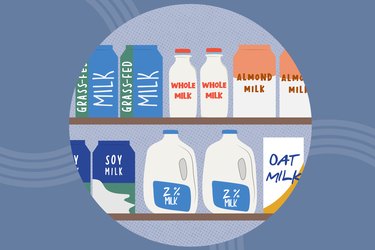
Research on the pros and cons of dairy is about as murky as unshaken oat milk. While some studies praise the calcium and protein content of yogurt, milk and cheese, others suggest there are links to inflammation and weight gain.
So it's no wonder we're all stumped when we get to the dairy aisle, our eyes scanning the rows upon rows (upon rows) of different fat percentages and plant-based alternatives while we desperately try to remember what the latest headline said.
Video of the Day
Video of the Day
For our Ask the RDs series, we asked readers to send us their biggest nutrition questions and then posed the 12 most common to a panel of registered dietitians. Unsurprisingly, dairy was one of the biggest sources of confusion among readers. Here's what the experts had to say.
Is Dairy Bad, Good or Somewhere in Between?
"I am a big proponent of dairy. There's no other food that provides the calcium, the vitamin D and the potassium that dairy does all in one package. Also, it's a great value: You get a lot of nutrients in a glass of milk, and it's not expensive.
Unless you're lactose intolerant or choose not to eat animal products, I think cutting dairy out is a mistake. Some people don't do well with fluid milk but they can have yogurt or aged cheeses to get their calcium.
Skim milk is not better than whole milk, in my opinion, because it doesn't taste very good, and some studies show that full-fat dairy products may have benefits for weight management. You'd be more satisfied with full-fat yogurt and might not need that midday snack.
Non-dairy milk alternatives aren't better than milk [assuming you're not lactose intolerant]. But they have their own merits, certainly. Nowadays, many people have multiple kinds of milk in the fridge. They'll have organic full-fat dairy milk, they'll have almond milk, they'll have oat milk, and I think that's the way things are going. I know my household is like that."
"When we're thinking about the environment, dairy comes from cows or goats and that's not great for the planet, given where we are with climate change. But if you're able to tolerate dairy and that's part of your food culture, I think that having plain dairy is OK.
We process our milk differently than in other countries. The carbohydrate content is a little different. Some people like skim milk because there's less fat, while others like 2 percent or whole milk because there's more fat. I think it boils down to the individual's likes and dislikes and what their health goals are.
Some of the non-dairy milk alternatives are fortified and don't end up having the same nutrient profile. So, for growing children, you'll want to be mindful that they're getting adequate nutrition. You absolutely can use non-dairy alternatives — I think it's a great thing and can be really delicious — just be aware of how it fits into your overall nutrition pattern."
Related Reading
"I definitely feel dairy can be part of a healthy diet. Dairy provides calcium, vitamin D, protein and leucine, which is a branched-chain amino acid that flips the muscle-building switch on. It is a lot cheaper than a lot of plant-based milk alternatives, too.
If someone's lactose intolerant, cheeses and a lot of yogurts have lower lactose because they're fermented. You can also buy lactose-free dairy milk.
There are a lot of misconceptions around dairy, such as the claim that it causes inflammation. But there's an ample amount of studies showing it can actually help ease inflammation. And many people think milk contains antibiotics but it never did: Cows can get sick and farmers give them antibiotics to get better, but milk gets tested before it gets to the grocery store. So there will never be antibiotics in your milk."
The Takeaway
Dairy contains important nutrients, such as calcium, vitamin D, potassium and protein, and can definitely be part of a healthy diet. Claims that full-fat dairy products pose a direct threat to your health and weight are unsubstantiated. Deciding between skim and other fat percentages ultimately comes down to your own personal preferences. If you're lactose intolerant, vegan or concerned about the sustainability of dairy (or just like having more options in your fridge), lactose-free dairy products or non-dairy alternatives are good options — just check the labels to make sure they're still fortified with the nutrients found naturally in dairy.
Confused about nutrition? Get answers to more common questions in our Ask the RDs series.


